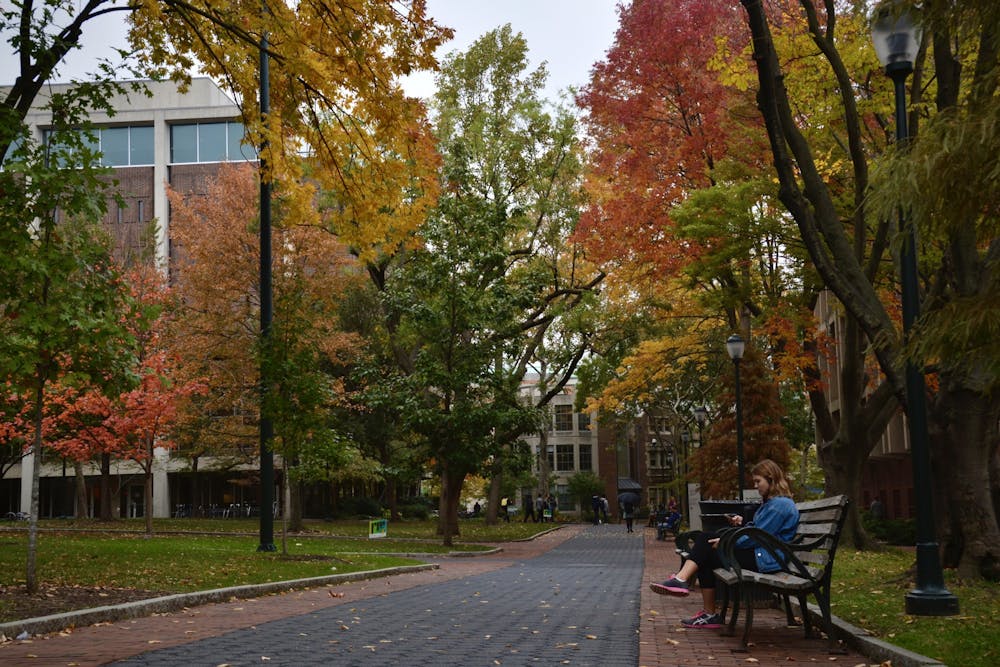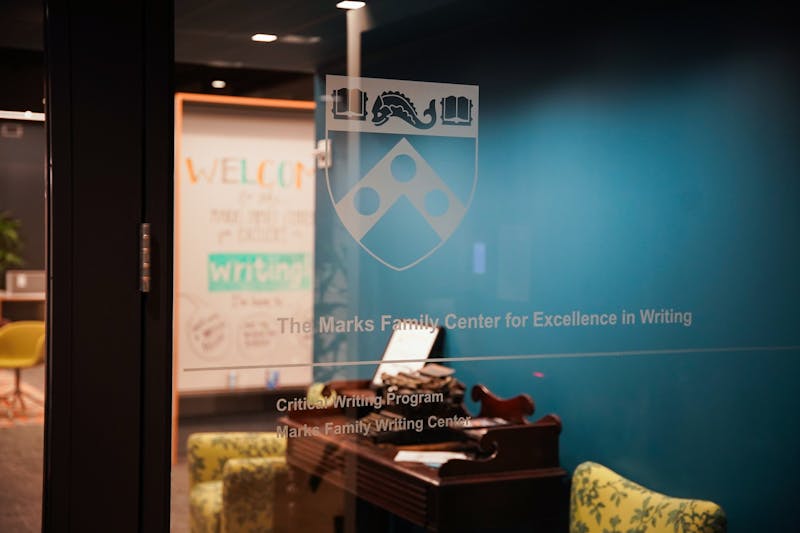
Penn is currently considering four scenarios for the fall semester.
Credit: Kylie CooperThis is a developing story that was last updated at 4:51 p.m. on June 25. Please check back here for updates.
After finishing the spring semester online, colleges across the United States are currently determining what the upcoming fall 2020 semester will be like. Institutions in the Philadelphia region are considering many variations of college life, including full in-person instruction, hybrid in-person and virtual instruction, and a fully virtual semester.
Here is how Philadelphia-area colleges are planning for the fall.
University of Pennsylvania
Penn will bring students back to campus for the fall 2020 semester under a hybrid model of in-person and online instruction, as announced by President Amy Gutmann, Provost Wendell Pritchett, and Executive Vice President Craig Carnaroli in a University-wide email sent on June 25.
The fall semester will begin on Sept. 1 and end on Dec. 22. Fall Break, Oct. 1-4, has been eliminated to allow the University to shift to a fully remote environment by Nov. 20. The remainder of the semester, beginning on Nov. 23, and final exams will be conducted online to limit the spread of the coronavirus.
Students who are unable to return to campus for any reason are allowed to remain off campus and pursue a fully virtual learning environment.
According to the University FAQ "Student Campus Compact" page, classes with more than 25 students will be recorded and have an online foundation. Those with fewer than 25 students may have an in-person option, space permitted, and will be held in larger spaces. Recordings of class meetings will also be provided for students who need the option of asynchronous learning.
The University is guaranteeing on-campus housing for first years, sophomores, and transfer students. Every student will live in a private bedroom with a maximum ratio of six students per shared bathroom. Juniors and seniors who requested on-campus housing will be relocated to Sansom Place East or an off-campus property, according to an email sent by Penn Residential Services on June 25.
Move-in dates will be staggered to minimize the risk of coronavirus transmission and New Student Orientation, which takes place from Aug. 24 to Aug. 31, is expected to be mostly online.
Those who choose to return to campus must agree to adhere to the Student Campus Compact, which requires students to wear face coverings when in public, maintain physical distancing measures, and avoid crowds larger than 25 people.
All students will be tested for COVID-19 upon arrival, with ongoing testing available in Houston Hall. The University will also facilitate contract tracing and daily symptom checking for everyone on campus. Students who test positive for coronavirus will quarantine in Sansom West.
Community College of Philadelphia
Community College of Philadelphia President Donald Generals announced on May 26 that fall semester courses will be conducted entirely online.
Generals added that limited on-campus services may be possible in the summer or fall given local and state guidelines, but felt that “it was necessary to make a decision now about fall classes to give us time to meet all standards for online course delivery.”
Students already registered for on-campus classes in the fall will receive an individualized email advising them on the transition to a fully virtual environment.
Drexel University
Drexel will begin on-campus instruction September 21 and conclude its fall quarter on December 14. Students living on-campus will be asked to depart campus by Thanksgiving and complete the remainder of the term online, including finals, according to a community-wide announcement on June 10 by University President John Fry.
The University will announce its finalized plan once Pa. Governor Tom Wolf determines the state’s “green” phase of reopening.
To ensure student safety, a hybrid model of in-person and virtual instruction will be used. At this time, the University has asked departments to categorize which classes should be offered on campus, which can be offered in a hybrid format, and which can be conducted fully online.
Additionally, the University is advocating for the use of face masks, contact tracing, health and safety training, and limiting the number of students and staff on campus at any given time to encourage social distancing.
Haverford College and Bryn Mawr College
Haverford President Wendy Raymond, in a joint statement with Bryn Mawr President Kim Cassidy, announced on June 8 that in-person classes will be held starting on Sept. 8, barring any future coronavirus or government-related restrictions.
With fall break canceled, in-person instruction for both Colleges will end on Nov. 20 with students returning home for Thanksgiving break. The remaining fall semester classes from Nov. 30 to Dec. 11, including finals, will be completed virtually. The semester will end on Dec. 18.
Students who do not return to campus will have the opportunity to take classes remotely, although every class will not be offered online.
To ensure student safety, Haverford and Bryn Mawr’s Bi-College Continuity Planning Group has consulted infectious disease experts from a variety of institutions and government organizations, including leaders from Penn, Johns Hopkins, and the CDC. All community members will be expected to wear masks, support social distancing guidelines, do contact journaling, and symptom checking. The Colleges also have operation teams to check classroom airflow, food services, and dorm density practices.
Students are asked not to make travel plans back to campus at this time, as the colleges are hoping to stagger arrivals so as to minimize the number of travelers going in and out of the campuses at any given time.
Saint Joseph’s University
On June 5, the University announced to the SJU community that it plans to welcome students back to campus on August 24, eliminate fall break, and end on-campus instruction by Thanksgiving. Students who return home for Thanksgiving are asked to stay home.
SJU expects to keep residence halls open through December 12, which is the last day of final exams, for students who do not return home for Thanksgiving.
All students, regardless of where they are, are to complete the semester and final exams virtually.
Summer orientations, occurring in late June for incoming students, have already been moved online.
Swarthmore College
Swarthmore President Valerie Smith plans to share a plan for the next academic year by mid to late June, according to an email sent to the Swarthmore community on May 14.
The College's Academic Continuity Working Group outlined the pros and cons of various scenarios for fall semester operations, and delivered its report to President Smith on May 8. The recommendations are currently under review.
A survey sent to the student body the following day found that some students felt online learning would be the “safest way to start or conduct fall semester,” while others stated that they intend to take a leave of absence should classes be online.
“We very much share a desire to continue in the fall as we typically would. Yet there is so much we do not, cannot, and will not know — about testing, vaccines, and travel restrictions, among many other constraints — that complicates our ability to plan effectively,” wrote the Academic Continuity Working Group in the May 14 email.
Temple University
On June 2, Temple President Richard Englert announced that the University will have on-campus classes in the fall, citing relaxing state coronavirus regulations.
The University expects to have a hybrid of in-person and online instruction starting on August 24, with large classes occurring virtually and in smaller break-out sessions. On-campus activities are expected to end on November 20, when students are to return home and conclude the semester and final exams online.
To ensure safety, the University will be providing masks and mandating that they are worn, installing hand sanitizer stations throughout the campus, encouraging social distancing, and recommending that all members of the community self-monitor their symptoms.
University Health Services will set up an on-campus testing site and a contact tracing unit.
To prepare for an on-campus fall semester, Temple announced five phases of reopening.
The first and second phases will implement safety measures in buildings, such as plexiglass shields in reception areas, and increase research activities on campus and in clinics.
On June 23, the University expects to implement the third phase, in which a small number of summer classes are to be held in-person. This stage will also allow the University to test some of the protocols it plans on implementing in the fall.
Phases four and five, beginning on August 1 and continuing throughout the month of August, will see students slowly moving into campus and the surrounding neighborhoods.
“While many questions remain,” President Englert said, “I am confident that we can open on time as a residential university, and operate in a way that reduces the risks to our community’s health while continuing to offer quality educational experiences to our students.”
Thomas Jefferson University
In an April 28 statement to all students, President Stephen Klasko wrote that the University plans to resume on-campus classes and operations in the fall.
To ensure student and faculty safety, plans to create smaller classes will be made by expanding class schedules. TJU is also developing more options for digital learning to take place on campus, and is exploring all-digital learning opportunities for students who do not want to return to campus.
The University is also making plans to open residence halls, as well as dining, athletic, and other campus facilities, in a manner that will maximize community safety.
Villanova University
In a June 23 video message to the Villanova community, President Rev. Peter Donohue announced that students will return on August 17 for an on-campus fall semester that will include both virtual and in-person classes.
Fall break has been eliminated and on-campus activities will end on November 24, when students are expected to leave campus for Thanksgiving break. Final exams will be conducted online after Thanksgiving.
Though social distancing will be enforced through measures like expanded online class offerings and the reconfiguration of classrooms, students will still be allowed to live with roommates on campus if they choose.
Donohue asked all students and staff to agree to a “Community First” commitment, which outlines the need to wash hands frequently, social distance, wear a mask, and stay home when sick. Further, the University president said its Student Health Center will test students, oversee contact tracing, and provide space on campus for students to quarantine.
According to the University’s coronavirus Frequently Asked Questions page, further information about the University’s fall semester plans will be shared during the week of June 29.
West Chester University
President Christopher Fiorentino announced on June 11 that the University will begin on-campus fall classes on August 24, as originally scheduled. On-campus instruction will include both remote and in-person components.
Fall Break has been moved from October 12-13 to November 23-24, with a full transition to remote learning and final examinations occurring on November 30 until the remainder of the fall semester.
In order to reduce the risk of coronavirus transmission during the semester, all meetings, including office hours and student advising, will be conducted virtually; sanitization efforts will increase in accordance to CDC guidelines; classrooms will be reorganized to facilitate social distancing; the number of staff on campus will be decreased; coronavirus testing protocols will be introduced; and students and employees will be required to wear masks.
The email also states that appropriate adjustments will be made to student fees, like dining and housing, should coronavirus affect the course of the semester.
The Daily Pennsylvanian is an independent, student-run newspaper. Please consider making a donation to support the coverage that shapes the University. Your generosity ensures a future of strong journalism at Penn.
Donate







